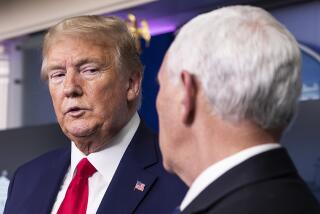Coup Attempt Had Quayle Presiding Over His 1st Security Crisis : Philippines: Vice President’s backers pleased with the way he handled himself in absence of President Bush.
- Share via
WASHINGTON — Dan Quayle’s moment in the sun came shortly after midnight.
Stationed deep in the most secure quarters of the White House--the National Security Council’s Situation Room--the vice president presided over his first national security crisis while the commander in chief, President Bush, was en route to Malta.
Quayle was notified about 10 p.m. Thursday by Deputy National Security Adviser Robert M. Gates about grave developments in the Philippines.
Reporting to the special crisis management room, he coordinated the U.S. response from 11:30 p.m. to 5:30 a.m. and filled the position normally held by the President as focal point for top officials’ reports as the military conflict unfolded.
For a vice president whose leadership abilities were roundly questioned during the campaign, it was a chance to shine and one that he seized with gusto.
Although his role was played out in private, Quayle’s supporters were clearly pleased that the accounts of his performance that filtered out later from various sources were generally favorable.
With his suit jacket on and his tie neatly knotted all night long, Quayle faced a wall of video monitors that provided up-to-the-moment information on the coup, according to one person present. He used the closed-circuit television hookup to quiz Gen. Colin L. Powell, chairman of the Joint Chiefs of Staff, Undersecretary of State Robert M. Kimmitt and CIA Director William H. Webster about reports from the Philippines reaching the Pentagon, the State Department and the CIA.
By telephone, he talked twice with Aquino in Manila, receiving her request for U.S. military help to help contain the rebels, and relaying Bush’s decision at 12:30 a.m. to provide U.S. fighter patrols over rebel-controlled air bases.
Throughout the night, Quayle’s top aide, William Krystol, never left his side, according to one official. But several persons said it was Quayle who actively monitored the developments.
Worried that the rebels might attack the U.S. Embassy in Manila in retaliation for the assistance being given to Aquino, Quayle overrode embassy objections and ordered a company of U.S. Marines to take up defensive positions.
Sources said Quayle also made sure that the message to the rebels holding the air bases was clear: “You guys get in the planes and try to fly out, we’ll shoot the daylights out of you,” said one official.
Times staff writer Norman Kempster contributed to this story.
More to Read
Get the L.A. Times Politics newsletter
Deeply reported insights into legislation, politics and policy from Sacramento, Washington and beyond. In your inbox twice per week.
You may occasionally receive promotional content from the Los Angeles Times.







